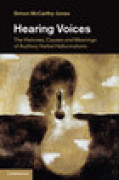
Hearing voices: the histories, causes and meanings of auditory verbal hallucinations
Mccarthy-jones, Simon
A comprehensive exploration of the history, phenomenology, meanings and causes of hearing voices that others cannot hear (auditory verbal hallucinations). The history, phenomenology, meanings and causes of hearing voices that others cannot hear (auditory verbal hallucinations) are explored in this book, which travels from voice-hearing in the ancient world through to contemporary experiences and neuroscience, examining how power, politics, gender, medicine and religion have shaped the meaning of hearing voices. The history, phenomenology, meanings and causes of hearing voices that others cannot hear (auditory verbal hallucinations) are explored in this book, which travels from voice-hearingin the ancient world through to contemporary experiences and neuroscience, examining how power, politics, gender, medicine and religion have shaped the meaning of hearing voices. The meanings and causes of hearing voices that others cannot hear (auditory verbal hallucinations, in psychiatric parlance) have been debated for thousands of years. Voice-hearing has been both revered and condemned, understood as a symptom of disease as well as a source of otherworldly communication. Those hearing voices have been viewed as mystics, potential psychiatric patients or simply just people with unusual experiences, and have been beatified, esteemed or accepted, as well as drugged, burnt or gassed. This book travels from voice-hearing in the ancient world through to contemporary experience, examining how power, politics, gender, medicine and religion have shaped the meaning of hearing voices. Who hears voices today, what these voices are like and their potential impact are comprehensively examined. Cutting edgeneuroscience is integrated with current psychological theories to consider what may cause voices and the future of research in voice-hearing is explored. Advance praise: 'The book brings together contributions from biological and psychological research, and more originally, it documents the history of hearing voices and the meaning of such experiences. Dr McCarthy-Jones's book is grounded on scientific research and comprehensively researched historical material. The book is a real feast, and Dr McCarthy-Jones charms us with his lively narrative. The book will appeal to modern 'voice-hearers', clinicians, and scholars of auditory hallucinations.' Flavie Waters, University of Western Australia INDICE: Introduction; Part I. A History of Hearing Voices: 1. From ancientMesopotamia to the pre-Reformation world; 2. Political voices: religion, medicine and hearing voices; 3. From the birth of psychiatry to the present day; Part II. The Phenomenology and Lived Experience of Hearing Voices: 4. The phenomenology of hearing voices in people with psychiatric diagnoses; 5. The lived experience of hearing voices in individuals diagnosed with psychotic disorder,or: the journey from patient to non-patient; 6. Beyond disorder: religious and cross cultural perspectives; 7. The phenomenology of hearing voices in people without psychiatric diagnoses; Part III. The Causes of Hearing Voices: 8. Neuroscience and hearing voices: it's the brain, stupid; 9. Neuropsychological models I: inner speech; 10. Neuropsychological models II: memory and hypervigilance; 11. The wound is peopled from world to brain and back again; Part IV. The Meanings of Hearing Voices: 12. The struggle for meanings; Conclusion: moving towards new models of hearing voices; Appendix A: AVHS and antipsychotic medication; References; Index.
- ISBN: 978-1-107-00722-2
- Editorial: Cambridge University
- Encuadernacion: Cartoné
- Páginas: 470
- Fecha Publicación: 05/04/2012
- Nº Volúmenes: 1
- Idioma: Inglés
